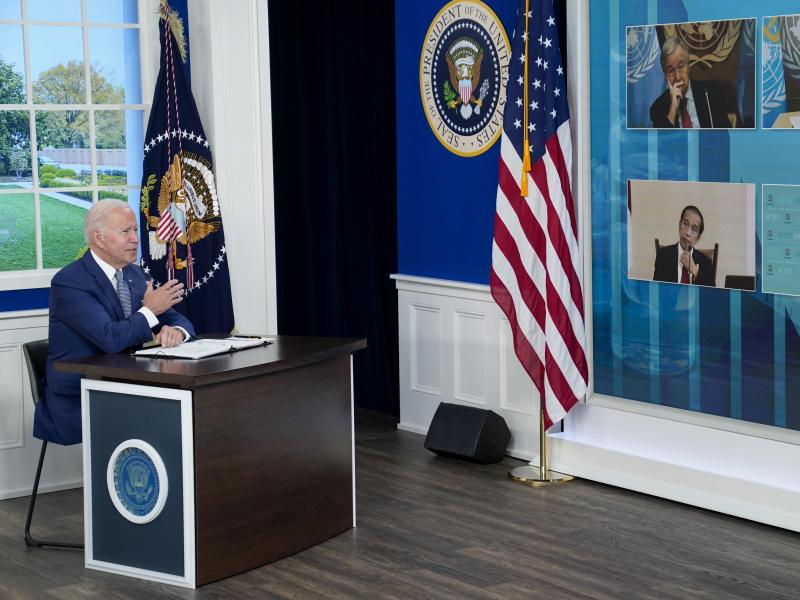
The central premise and promise of the Biden campaign in 2020 was that he’d return things to normal. But, normal meant different things to different people. For some ‘normal’ meant a return to a pre-Trumpian model of presidential leadership; one with more gravitas and stability and less drama, chaos and late-night tweeting. For others, ‘normal’ meant a return to pre-COVID life of social gatherings, in-person schooling and a re-opened economy. While for others, ‘normal’ meant dismantling the divisive policies of the Trump era and replacing them with more progressive and inclusive programs.
But, less than 10 months into the job, none of those definitions of ‘normal’ have been fulfilled.
To be sure, it was always unrealistic to think that one person - even a president - could single-handily out-muscle our deep-seated partisanship. Even so, many had hoped that he could at least lower the temperature. Today, however, the heat is as strong as ever. In Washington, Minority Leader Mitch McConnell and Senate Leader Chuck Schumer are locked in a legislative game of chicken over raising the debt ceiling. Senator Ted Cruz is holding up State Department nominees over the Biden Administration’s support of the Russian pipeline Nord Stream 2. And, Sen. Krysten Sinema is being hounded everywhere she goes - including the restroom - by liberal activists who see her as an impediment to passing everything from protections for undocumented immigrants to the $3.5T reconciliation package.
In the states, Republican elected officials continue to traffic in false claims of fraud in the 2020 election, while overseeing partisan re-examinations of 2020 ballots in states like Wisconsin, Arizona, Michigan, and Pennsylvania and Georgia. All of these states had official post-election audits that confirmed the accuracy and integrity of the 2020 results. Far from making elections more “secure,” these partisan tactics only serve to undermine faith in future elections. Even though Trump is no longer in the White House, fanning the flames of mistrust in the elections, claims of #stopthesteal will continue into the midterms. So much for a ‘normal’ midterm.
Politics in the Biden era have not gotten any less divisive. Voters continue to see the other side as an existential threat. A survey conducted this summer by the University of Virginia Center for Politics and Project Home Fire found the divide between Trump voters and Biden voters to be “deep, wide and dangerous.” For example, 80 percent of Biden voters and 84 percent of Trump voters agreed with the statement that elected officials from the opposite party represent a “clear and present danger to American democracy,” while three-quarters of both Trump and Biden voters think that supporters of the opposite party themselves represent a “clear and present danger to the American way of life.”
Then there’s the issue of COVID itself. Many of those who had hoped that a vaccine would allow them to return to their ‘normal lives’ are overwhelmed by the torrent of information and misinformation about COVID coming at them. As one younger Black man described it in a recent focus group, “you just don’t know what’s real anymore.” The issue of vaccine mandates has been weaponized by Democrats in the Virginia governor’s race and the recall attempt of California Gov. Gavin Newsom.
For those who had hoped that Biden’s pledge to a return to established norms would mean tackling problems like police violence against communities of color and the plight of DACA recipients, there’s little to be optimistic about. A bipartisan attempt at police reform between GOP Sen. Tim Scott and Democratic Sen. Cory Booker and Rep. Karen Bass, fell apart in late September and isn’t likely to be revived this year. Despite a pledge for more compassionate policies for immigrants, two senior state department officials have resigned in recent weeks over what they describe as the Biden administrations ‘inhumane’ treatment of Haitian and other migrants at the southern border.
This lack of momentum on these issues may help explain the substantial drop in support for Biden among some of the most loyal Democratic voters. A recent Pew survey, for example, found President Biden’s job approval among all voters had dropped 11-points since July. However, some of the biggest drops in support came from young voters (-14) and Black voters (-18).
A return to a ‘normal’ economy has also been elusive. Supply chains remain clogged, as do the nation’s ports and railyards. Rising wages have been offset by rising inflation. “Even if transient, higher inflation has already decreased living standards,” wrote Richard Curtin, the chief economist for the University of Michigan’s Surveys of Consumers this week, “and further damage is anticipated as just 18% of all households anticipated income gains would be larger than the expected inflation rate.” Many employees are in limbo — waiting for their employers to give them definitive guidance about whether they can - or will be able to - continue to work from home.
The prevailing mood among voters in the focus groups I’ve been watching since this summer is frustration. They thought, or had hoped, that things would be better by now. Instead, it feels to many as if we are running in place. Instead of getting ‘back to normal,’ we have settled into a ‘new normal’ of deep polarization and dysfunctional governing.

Subscribe Today
Our subscribers have first access to individual race pages for each House, Senate and Governors race, which will include race ratings (each race is rated on a seven-point scale) and a narrative analysis pertaining to that race.